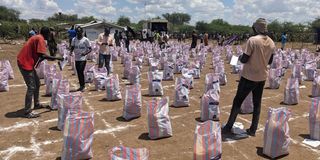Premium
USAID funding cuts disrupt vulnerable rural livelihoods in Turkana

Baskets with relief food that include cooking oil, rice, beans, wheat flour, maize flour and salt as well as non food items like sanitary towels for women and girls at Kakuma 3 section of Kakuma Refugee Camp on March 22, 2025.
Mr Nabokat Katodi, a 24-year-old from Todanyang village in Turkana North Sun County was last year hit by drought losing more than 46 goats and sheep to prolonged drought.
He was introduced to pastoralism at a tender age by his parents, who had for decades relied on pastoralism as the main source of livelihood.
“Through interaction with his peers, who besides being pastoralists, were practicing fishing on Lake Turkana, as a youth, I had no option but to learn the new venture where we could hire wooden boats to fish," Mr Katodi told Nation.Africa.
Lady luck smiled on him when he was among the first beneficiaries of Ujuzi Mashinani programme funded by USAID Nawiri. He acquired basic boat-making skills after enrolling at the Kataboi Vocational Training Center. He was able to make his boat thus saving cost of hiring the wooden boats.
"As youth we also make sure that we form active Beach Management Units that through proposals we can get help from government agencies and development partners to boost our fishing ventures," Mr Katodi said.
His group is among eight others that in October benefited from a Sh 253 Million joint investment from Turkana County government, national government and USAID to strengthen community resilience through strategic co-investments.
"We are happy to benefit from fiberglass boats for us to easily venture into deep waters so that we boost our catches and increase income. Fiberglass boats are more durable and can last longer," Mr Katodi said.
At Naoros village, Mr Peter Eyanae said that their land that is sandwiched between Turkwel river to the east and Lake Turkana to the west has borne the brunt of climate change.
Pastoralism which has been the main source of livelihoods for multiple generations including that of his grandfather has faced perilous threats from severe drought.
"In 2019, losing most goats and sheep I inherited from my father due to lack of forage and water as well as unsuccessful attempts to move with weak livestock near the border of Uganda in search of pasture, made me realize that such adaptive strategy was untenable," Mr Eyanae said.
Being near Lake Turkana, he had to take the painful step of abandoning traditional herding lifestyles in favor of fishing, leading to significant shift in livelihood.
"As a pastoralist, I was mainly relying on milk and meat for survival and though I would see most fishermen being my peers when I would lead livestock to the lake to quench thirst, I didn't know I would join them one day," he said.
It was easy to adapt to the new livelihood as he joined a beach management unit where his peers trained him and lend him boats occasionally.
He was however among the more than 200,000 fishermen hit hard by the sustained swelling of Lake Turkana that submerged fish landing sites, fish stores and accessible fishing zones.
He later resorted to farming because the village is near Turkwel river that flows to the lake.
Mr Eyanae and other 365 villagers joined hands to rehabilitate the once arable land in the village that some of their grandparents also used to grow indigenous crops to complement pastoralism.
The now USAID Nawiri supported Nadocha Farm that is 400 acres in size has now proved a sustainable livelihood project for the village that was among most hit villages by drought.
It is now transforming lives after a successful community-led canal rehabilitation with the main objective being to boost food production and fight malnutrition.
"We started farming in January last year. We are growing sorghum, maize, cowpeas and watermelon. We have been harvesting enough for our families consumption and surplus sold to neighboring villages yet to embrace farming," Mr Eyanae said.
Mr Eyanae and Mr Katodi said that their fears the USAID funding cuts locks out more potential beneficiaries who are at the moment hit hard by prolonged drought.
"More youth want to engage in alternative sources of livelihoods but they are limited by fundings. Even to us as beneficiaries, we used to be visited by well motivated extension officers to teach us better fishing and farming practices. Our fears are that we won't be able to maintain irrigation infrastructure and modern fishing equipment," Mr Katodi said.
USAID-funded programmes like training youth on electrical repair, plumbing, cell repair, honey production, and hay farming that were to significantly boost community income and foster better nutrition outcomes while enhancing their ability to adapt to future challenges were also hit by the funding cuts.
The situation has seen Governor Jeremiah Lomorukai calling for the restoration of USAID-funded programmes in the county.
When he hosted Marc Dillard, the US Chargé d’Affaires to Kenya, Governor Lomorukai highlighted that the funding cuts have severely affected livelihood activities, particularly in the health, livestock, and water sectors.
The Governor emphasized the significant role of public-private partnerships in Turkana supported by the United States, noting that the reduction in funding has also impacted refugees, leading to protests.
He expressed gratitude to the United States for being a key donor, whose support has complemented the County’s devolved functions to locals hit hard by effects of climate change.
He explained that Turkana’s vastness and historical marginalization make donor support crucial for supplementing the County Government’s efforts.
Mr Dillard however leaning towards refugees who recently held mass protests at Kakuma, assured the governor that United States has resumed funding for food support to refugees and critical health programmes.





